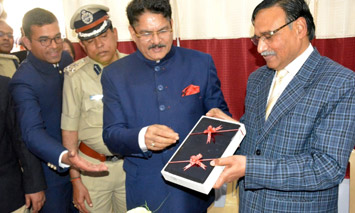Responsibilities of prosecution officers , (26 May 2022)
'Police' and 'Public Order' are State subjects under the Seventh Schedule to the Constitution of India and therefore, it is the primary duty of the State Governments to prevent, detect, register and investigate crime and prosecute the criminals. Central Government, however, supplements the efforts of the State Governments by providing them financial assistance for modernization of their Police Forces in terms of weaponry, communication, equipment, mobility, training and other infrastructure under the Scheme of Modernization of State Police Forces. Further, intelligence inputs are regularly shared by the Central Security and Intelligence Agencies with the State Law Enforcement Agencies to prevent crime and law and order related incidents.
The National Crime Records Bureau (NCRB), a nodal agency under the Ministry of Home Affairs, is engaged in the process of collecting, compiling and analysing the crime statistics with a view to help the States to evolve appropriate strategies for better prevention and control of crime. Further, the Bureau has established computerized systems at every District Crime Records Bureau (DCRB) and State Crime Records Bureau (SCRB), across the country, under a project viz., 'Crime Criminal Information system (CCIS)'. This system maintains a National - level Database of Crimes, Criminals and Property connected / involved in crime with the objective of helping the law enforcement agencies in prevention and detection of crime and improving service delivery mechanisms. In order to effectively deal with the menace of organized crime, another system, viz., Organized Crime Information System (OCIS) is being put in place under the guidance of NCRB.
The National Crime Records Bureau (NCRB), a nodal agency under the Ministry of Home Affairs, is engaged in the process of collecting, compiling and analysing the crime statistics with a view to help the States to evolve appropriate strategies for better prevention and control of crime. Further, the Bureau has established computerized systems at every District Crime Records Bureau (DCRB) and State Crime Records Bureau (SCRB), across the country, under a project viz., 'Crime Criminal Information system (CCIS)'. This system maintains a National - level Database of Crimes, Criminals and Property connected / involved in crime with the objective of helping the law enforcement agencies in prevention and detection of crime and improving service delivery mechanisms. In order to effectively deal with the menace of organized crime, another system, viz., Organized Crime Information System (OCIS) is being put in place under the guidance of NCRB.
